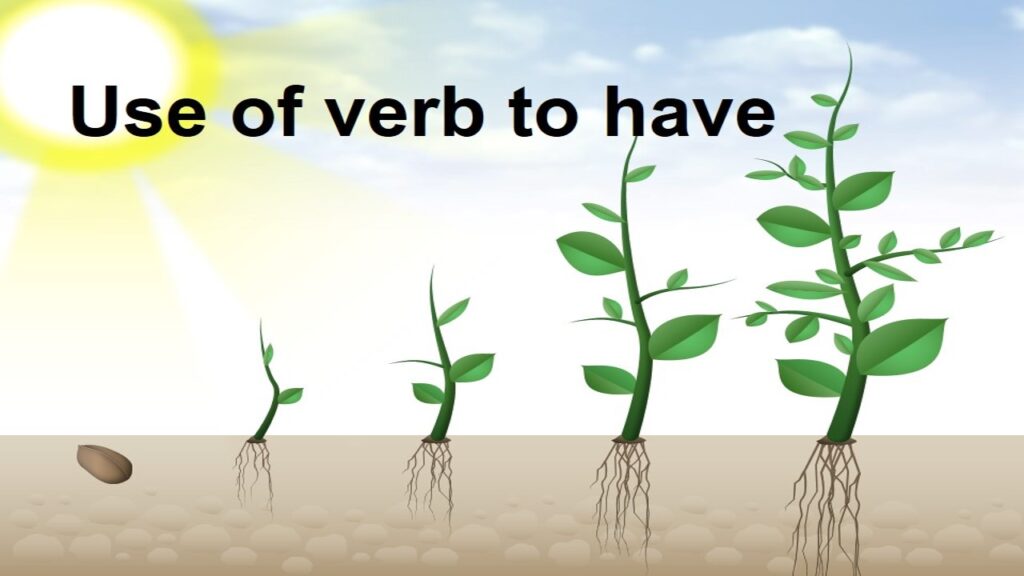Verb ‘to have’ का रूप Present Tense में have/has, Past Tense में had और Future Tense में shall have/will have होता है।
Have/Has/Had का प्रयोग अनेक अर्थों में होता है। इनमें से एक अर्थ है-रखना’। यह कर्ता के अधिकार/स्वामित्व/संबंध का भाव प्रकट करता है।
निम्नलिखित तालिका में have/has के प्रयोग, को पढ़े और समझें
Contents
Verb to have Learning Charts
| Person | Singular | Plural |
| First Person | I have a ball. | We have a ball. |
| Second Person | You have a ball. | You have a ball. |
| Third Person
|
He has a ball.
She has a ball. It has a ball. Ram has a ball. |
They have a ball.
The boys have a ball. Raj & Ravi have a ball. |
Verb to have Solved Examples
- मेरे पास एक कुत्ता है। I have a dog.
- मैं एक कुत्ता रखता हूँ। I have a dog.
- मुझे एक कुत्ता है। I have a dog.
- हमलोगों के पास एक गाय है। We have a cow.
- आपलोगों के पास एक बैल है। You have an ox.
- तुम्हें एक मोटरसाइकिल है। You have a motorcycle.
- उसे एक साड़ी है। She has a saree.
- राधा के पास खिलौने हैं। Radha has toys.
- उनलोगों के पास कुरसियाँ हैं। They have chairs.
- मेरे पिताजी को एक लाल कार है। My father has a red car.
- राम और राज के पास घोड़े हैं। Ram and Raj have horses.
- उन्हें रुपए-पैसे हैं। They have money.
- इसे दो सींग हैं। It has two horns.
Use of Had
Have/has का Past रूप Had होता है । Had से भी भूतकाल में कर्ता के स्वामित्व/अधिकार/संबंध का भाव प्रकट किया जाता है।
जैसे
- मुझे एक गाय थी। I had a cow.
- आपके पास दो घोड़े थे। You had two horses.
- राम को समस्याएँ थीं । Ram had problems.
- लड़कों के पास थैले थे। The boys had bags.
- इसे एक छोटी पूँछ थी। It had a small tail.
Negative Sentences
इन्हें ध्यान से पढे और समझें
1.मेरे पास पेंसिल नहीं है। I have no pencil. or, I have not a pencil.
2.मेरे पास नीली पेंसिल नहीं है। I have no blue pencil. or, I have not a blue pencil.
3.श्याम के पास बैल नहीं था। Shyam had no ox. or, Shyam had not an ox.
Note: ऐसे वाक्यों का अनुवाद प्रायः no लगाकर करें। यदि Noun के पहले a/an का प्रयोग करना हो, तो not का प्रयोग करें।
Note: जब Noun अकेले आए या Noun के पहले good, red, new आदि रहे, तब no का प्रयोग करें।
जब Noun के पहले a, an, the, any, many, much, enough या संख्याबोधक शब्द (one, two, three, etc.) रहे, तब not का प्रयोग करें।
जैसे
- मेरे पास किताब नहीं है। I have no book.
- मेरे पास किताबें नहीं हैं। I have no books.
- मेरे पास चीनी नहीं है । I have no sugar.
- तुम्हारे पास बिल्ली नहीं है। You have no cat.
- तुम्हें काली बिल्ली नहीं है। You have no black cat.
- तुम्हें काली बिल्लियाँ नहीं हैं। You have no black cats.
- मुझे दो किताबें नहीं हैं। I have not two books.
- मुझे कोई किताब नहीं है। I have not any book.
- उसे अनेक गुड़ियाँ नहीं थीं। She had not many dolls.
- उसे पर्याप्त पैसे नहीं थे। He had not enough money.
- उसे अधिक धन नहीं था। He had not much wealth.
Interrogative Sentences
इन वाक्यों में Have/Has/Had को Subject (कर्ता) के पहले रखें।
जैसे
- क्या तुम्हारे पास सेब है? Have you an apple?
- क्या आपके पास कोट है? Have you a coat?
- क्या राम के पास बिल्लियाँ हैं? Has Ram cats?
- क्या आपके पास चीनी है? Have you sugar?
- क्या आपको कोई समस्या है? Have you any problem?
- क्या राजा के पास हाथी थे? Had the king elephants?
- क्या उसे कोई शक था? Had he any doubt?
- क्या आपके पास जीप थी? Had you a jeep?
Use of Shall have & Will have
सामान्यतया I/We के साथ shall have तथा अन्य Subjects के साथ will have का प्रयोग होता है।
जैसे
- मेरे पास एक कार होगी। I shall have a car.
- तुम्हें एक अँगूठी मिलेगी। You will have a ring.
- हमें सफलता मिलेगी। We shall have success.
- उसे सब कुछ मिलेगा। He will have everything.
- तुम्हें शांति नहीं मिलेगी। You will not have peace.
- मेरे पास पैसे नहीं रहेंगे। I shall not have money.
- क्या हमारे पास दौलत होगी? Shall we have wealth?
Note: (I) shall/will के बाद not लगाकर Negative Sentence और shall/will को Subject के पहले रखकर Interrogative Sentence बनाया जाता है।
(II) shall/will के बाद has का प्रयोग कभी नहीं होता।

